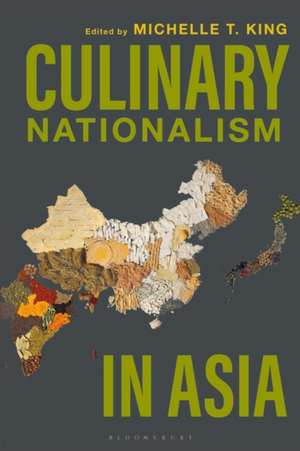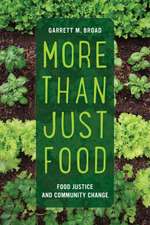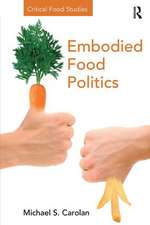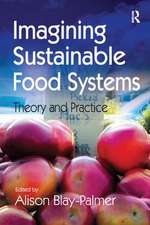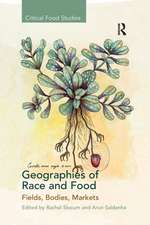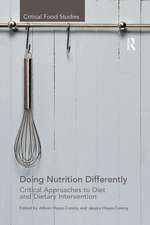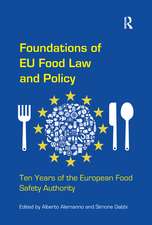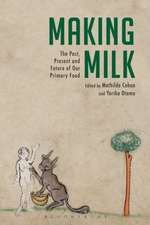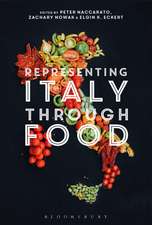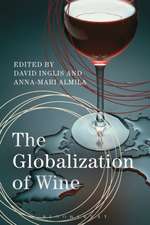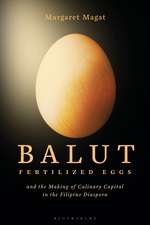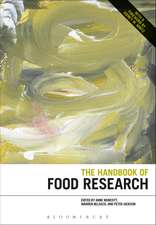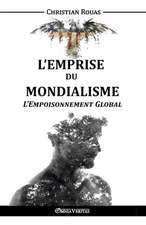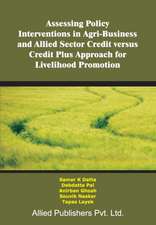Culinary Nationalism in Asia
Editat de Michelle T. Kingen Limba Engleză Paperback – 26 ian 2022
Toate formatele și edițiile
| Toate formatele și edițiile | Preț | Express |
|---|---|---|
| Paperback (1) | 199.56 lei 6-8 săpt. | |
| Bloomsbury Publishing – 26 ian 2022 | 199.56 lei 6-8 săpt. | |
| Hardback (1) | 658.11 lei 6-8 săpt. | |
| Bloomsbury Publishing – 10 iul 2019 | 658.11 lei 6-8 săpt. |
Preț: 199.56 lei
Preț vechi: 258.83 lei
-23% Nou
Puncte Express: 299
Preț estimativ în valută:
38.18€ • 40.08$ • 31.69£
38.18€ • 40.08$ • 31.69£
Carte tipărită la comandă
Livrare economică 11-25 aprilie
Preluare comenzi: 021 569.72.76
Specificații
ISBN-13: 9781350236868
ISBN-10: 1350236861
Pagini: 304
Ilustrații: 25 bw illus
Dimensiuni: 156 x 234 mm
Greutate: 0.43 kg
Editura: Bloomsbury Publishing
Colecția Bloomsbury Academic
Locul publicării:London, United Kingdom
ISBN-10: 1350236861
Pagini: 304
Ilustrații: 25 bw illus
Dimensiuni: 156 x 234 mm
Greutate: 0.43 kg
Editura: Bloomsbury Publishing
Colecția Bloomsbury Academic
Locul publicării:London, United Kingdom
Caracteristici
The
first
work
of
its
kind
to
draw
interdisciplinary
comparisons
between
a
variety
of
nation
states
in
Asia.
The
burgeoning
interest
in
Asian
cuisine
will
make
this
a
popular
book.
Notă biografică
Michelle
T.
Kingis
Associate
Professor
in
the
Department
of
History
at
the
University
of
North
Carolina
at
Chapel
Hill,
USA.
She
is
the
author
ofBetween
Birth
and
Death:
Female
Infanticide
in
Nineteenth-Century
China(2014).
Cuprins
List
of
FiguresList
of
MapsForeword:
Food
in
the
Making
and
Unmaking
of
Asian
NationalismsKrishnendu
RayAcknowledgmentsMapsIntroduction:
Culinary
Nationalism
in
AsiaMichelle
T.
KingPart
One
Historical
Legacies1
"Vegetarian"
Nationalism:
Critiques
of
Meat
Eating
for
Japanese
Bodies,
1880-1938Tatsuya
Mitsuda2
Food,
Gender,
and
Domesticity
in
Nationalist
North
India:
Between
Digestion
and
DesireRachel
Berger3
A
Cookbook
in
Search
of
a
Country:
Fu
Pei-mei
and
the
Conundrum
of
Chinese
Culinary
NationalismMichelle
T.
King4
From
Military
Rations
to
UNESCO
Heritage:
A
Short
History
of
Korean
KimchiKatarzyna
J.
CwiertkaPart
Two
Internal
Boundaries5
Priestess
of
Sake:
Woman
as
Producer
in
Natsuko's
SakeSatoko
Kakihara6
Defining
"Modern
Malaysian"
Cuisine:
Fusion
or
Ingredients?Gaik
Cheng
Khoo7
Eating
to
Live:
Sustaining
the
Body
and
Feeding
the
Spirit
in
the
Films
of
Tsai
Ming-liangMichelle
E.
Bloom8
The
Politicization
of
Beef
and
Meat
in
Contemporary
India:
Protecting
Animals
and
Alienating
MinoritiesMichaël
BruckertPart
Three
Global
Contexts9
Writing
an
"International"
Cuisine
in
Japan:
Murai
Gensai's
1903
Culinary
NovelKuidoraku
Eric
C.
Rath10
Red
(Michelin)
Stars
Over
China:
Seeking
Recognition
in
a
Transnational
Culinary
FieldJames
Farrer11
Drinking
Scorpions
at
Trader
Vic's:
Polynesian
Parties,
Caribbean
Rum,
Chinese
Cooks,
and
American
TouristsDaniel
E.
Bender12
Laksa
Nation:
Tastes
of
"Asian"
Belonging,
Borrowed
and
ReimaginedJean
DuruzAfterword:
Feasting
and
the
Pursuit
of
National
Unity-American
Thanksgiving
and
Cantonese
Common-Pot
DiningJames
L.
WatsonNotes
on
ContributorsIndex
Recenzii
This
edited
collection
addresses
a
topic
that
is
both
timely
and
critical
considering
the
current
state
of
international
relations.
It
contributes
to
the
further
refinement
of
theoretical
considerations
around
the
use
of
food
to
construct
and
assert
national
identities,
setting
those
strategies
within
historical
as
well
as
contemporary
contexts.
Although
it
focuses
on
nations
in
Asia,
its
observations
are
universally
relevant,
and
can
be
applied
to
all
cultural
forms,
not
just
food
.
As
such,
this
volume
will
become
foundational
reading
in
a
number
of
disciplines,
including
Asian
studies,
international
studies,
mobility
studies,
history,
heritage
studies,
and
political
science,
as
well
as
food
studies.
Gathering a prominent group of scholars and publishing a book on this topic, is quite an accomplishmentthat definitely puts Dr. King's name on the list of food scholars.
With chapters by leading scholars in Asian food studies, Michelle King's essential volume takes us beyond the usual accounts of national cuisines as menus of inclusion and exclusion to analyze more diverse expressions of culinary nationalism.
This book will be a great discovery to everyone interested in transformation of cuisine and nation-making in modern Asia. It brings readers to understand the 'meal' in the political context for different historical trajectories in various Asian countries. The editor has done a great job by using the framework of culinary nationalism to enhance the vibrant discussions of food in relations to government policy, market consumption, and individual choices with excellent case studies all over Asia.
This electric collection of essays offers provocative insights into the dynamics of culinary nationalism across East, Southeast, and South Asia. Bringing together historical work, contemporary sociological analysis, and evocative studies of film and literature, Culinary Nationalism in Asia is redolent of laksa and kimchi alongside beef biryani and zongzi, and will be certain to stimulate lively debate and new work on the complex interplay between food cultures and nation-building.
Culinary Nationalism in Asiais a pioneering interdisciplinary work on food and nationalism in Asia. Creatively crossing disciplinary and geographical boundaries, the authors of essays illuminate an extraordinarily wide range of subjects, from religious tradition to scientific nutrition, to military ration, to the high-tech kitchen appliance. This is an outstanding contribution to food studies.
The rich culinary diversity in Asia is the focus of Michelle King's superb collection which sensitively analyses the connection between cuisine and nation. The concept of culinary nationalism revisits previous studies on national cuisine and illuminates geographical, historical and social aspects of cuisine as nations seek recognition for their culinary assets from UNESCO and the Michelin guide. This book is essential reading in sociology, anthropology, history and Asian Studies.
This territorially and conceptually ambitious monograph ably interrogates hierarchies and stereotypes of cuisines, ingredients, and tastes through the lens of nation-making, national imaginings, genealogies of belonging and un-belonging in a brilliantly multi-stranded volume that showcases cutting-edge research by established and emerging scholars across an array of disciplines such as anthropology, Asian studies, history, film, geography, food studies, and sociology.
This timely, thought-provoking collection deftly interrogates the relationships between foodways, modern nation-making, and the construction of class and ethnic boundaries within and across nations. Geographically spanning East, Southeast, and South Asia, and chronologically reaching from the late 19th century to contemporary times, this excellent volume allow us to comprehend how food-related practices and values have been key arenas for asserting and contesting identities in modern nation-states throughout Asia.
Gathering a prominent group of scholars and publishing a book on this topic, is quite an accomplishmentthat definitely puts Dr. King's name on the list of food scholars.
With chapters by leading scholars in Asian food studies, Michelle King's essential volume takes us beyond the usual accounts of national cuisines as menus of inclusion and exclusion to analyze more diverse expressions of culinary nationalism.
This book will be a great discovery to everyone interested in transformation of cuisine and nation-making in modern Asia. It brings readers to understand the 'meal' in the political context for different historical trajectories in various Asian countries. The editor has done a great job by using the framework of culinary nationalism to enhance the vibrant discussions of food in relations to government policy, market consumption, and individual choices with excellent case studies all over Asia.
This electric collection of essays offers provocative insights into the dynamics of culinary nationalism across East, Southeast, and South Asia. Bringing together historical work, contemporary sociological analysis, and evocative studies of film and literature, Culinary Nationalism in Asia is redolent of laksa and kimchi alongside beef biryani and zongzi, and will be certain to stimulate lively debate and new work on the complex interplay between food cultures and nation-building.
Culinary Nationalism in Asiais a pioneering interdisciplinary work on food and nationalism in Asia. Creatively crossing disciplinary and geographical boundaries, the authors of essays illuminate an extraordinarily wide range of subjects, from religious tradition to scientific nutrition, to military ration, to the high-tech kitchen appliance. This is an outstanding contribution to food studies.
The rich culinary diversity in Asia is the focus of Michelle King's superb collection which sensitively analyses the connection between cuisine and nation. The concept of culinary nationalism revisits previous studies on national cuisine and illuminates geographical, historical and social aspects of cuisine as nations seek recognition for their culinary assets from UNESCO and the Michelin guide. This book is essential reading in sociology, anthropology, history and Asian Studies.
This territorially and conceptually ambitious monograph ably interrogates hierarchies and stereotypes of cuisines, ingredients, and tastes through the lens of nation-making, national imaginings, genealogies of belonging and un-belonging in a brilliantly multi-stranded volume that showcases cutting-edge research by established and emerging scholars across an array of disciplines such as anthropology, Asian studies, history, film, geography, food studies, and sociology.
This timely, thought-provoking collection deftly interrogates the relationships between foodways, modern nation-making, and the construction of class and ethnic boundaries within and across nations. Geographically spanning East, Southeast, and South Asia, and chronologically reaching from the late 19th century to contemporary times, this excellent volume allow us to comprehend how food-related practices and values have been key arenas for asserting and contesting identities in modern nation-states throughout Asia.
